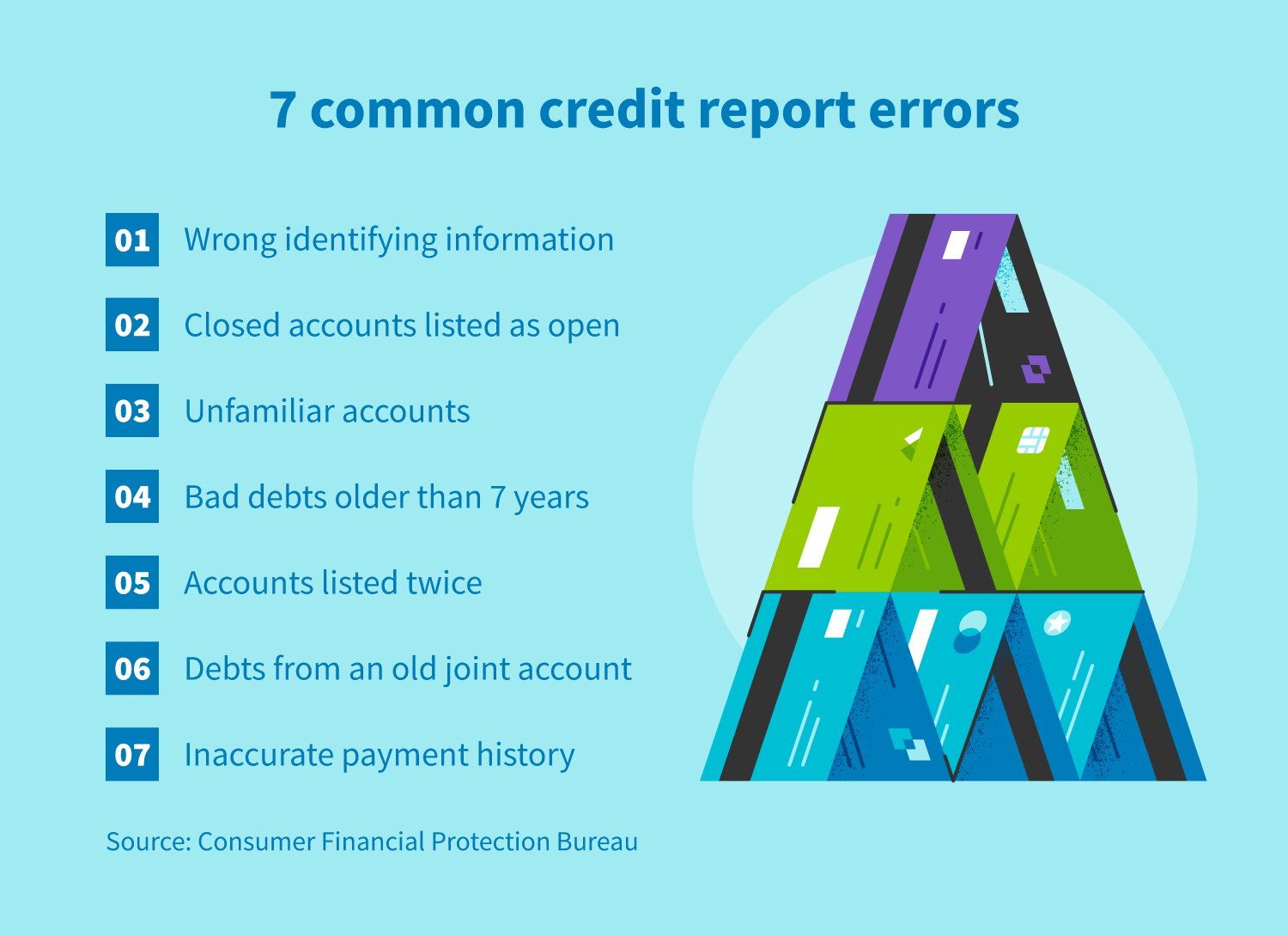If you’ve discovered errors on your credit report, you’re probably wondering how to dispute them successfully. Well, look no further! This article will guide you through the process of resolving credit report errors with ease. Whether it’s an incorrect late payment, a fraudulent account, or an outdated personal detail, we’ve got you covered. By following a few simple steps, you’ll be well-equipped to tackle any errors head-on and restore the accuracy of your credit report. So, without further ado, let’s dive into the world of disputing credit report errors successfully!
How to Dispute Credit Report Errors Successfully
Your credit report plays a vital role in your financial life. It contains information about your credit history, including loans, credit cards, and payment history. However, credit report errors can sometimes occur, and these errors can have a negative impact on your credit score and financial well-being. It’s essential to proactively monitor your credit report and take action to dispute any errors you find. In this article, we will guide you through the process of successfully disputing credit report errors.
The Importance of Reviewing Your Credit Report Regularly
Before diving into the dispute process, it’s crucial to understand why regularly reviewing your credit report is essential. Here are a few reasons to stay vigilant:
- Identify errors: Regularly reviewing your credit report allows you to spot any errors that may negatively impact your credit score and financial standing.
- Detect identity theft: By examining your credit report, you can identify any suspicious activity or signs of identity theft, such as accounts you didn’t open or unfamiliar addresses.
- Improve credit score: By identifying errors and taking action to correct them, you can improve your credit score and increase your chances of qualifying for better loan terms and interest rates.
Step-by-Step Guide to Dispute Credit Report Errors
Now, let’s take a detailed look at the step-by-step process to successfully dispute credit report errors:
1. Obtain a Copy of Your Credit Report
The first step is to obtain a copy of your credit report from each of the three major credit bureaus: Experian, TransUnion, and Equifax. You are entitled to one free credit report from each bureau annually through AnnualCreditReport.com.
2. Review Your Credit Report Thoroughly
Take the time to thoroughly review your credit report from all three bureaus. Look for any discrepancies, inaccuracies, or unfamiliar accounts. Pay close attention to the following:
- Personal information (name, address, Social Security number): Ensure that all your personal details are accurate.
- Accounts: Verify that all the listed accounts are yours and that the reported balances, payment history, and account status are correct.
- Public records: Check if there are any bankruptcies, tax liens, or judgments incorrectly listed.
- Inquiries: Look for unauthorized hard inquiries, which may indicate fraudulent activity.
3. Document the Errors
Once you identify errors or inaccuracies, gather evidence to support your dispute. Make copies of any relevant documents, such as billing statements, payment receipts, or correspondence with creditors. These documents will serve as evidence during the dispute process.
4. Contact the Credit Bureau
To initiate the dispute, contact the credit bureau(s) associated with the errors. You can submit your dispute online, by mail, or by phone. It is recommended to use certified mail when mailing your dispute to have proof of delivery.
5. Craft a Clear and Concise Dispute Letter
When writing your dispute letter, be sure to include the following information:
- Your contact information: Provide your full name, current address, and phone number.
- Identify the errors: Clearly state the specific errors you are disputing and provide a detailed explanation of why you believe they are incorrect.
- Supporting evidence: Attach copies of relevant documents that support your dispute and prove the inaccuracies in question.
- Request for correction: Clearly state that you are requesting the credit bureau to investigate and correct the errors.
- Keep a copy: Make a copy of your dispute letter and supporting documents for your records.
6. Contact the Creditor
In addition to contacting the credit bureau, it’s important to notify the creditor associated with the error. Send a separate letter to the creditor, including copies of the same supporting documents you provided to the credit bureau. Request that the creditor updates their records and provides corrected information to the credit bureaus.
7. Follow Up and Track Progress
After submitting your dispute, stay proactive by tracking the progress of your case. Credit bureaus typically have 30 days to investigate and respond to your dispute. During this time:
- Keep records: Maintain a record of all communications, including dates, times, and the names of the individuals you spoke to.
- Check for updates: Regularly check your credit report to see if the errors have been removed or updated.
- Follow up with the credit bureau: If no action or response is received within the specified timeframe, follow up with the credit bureau to ensure your dispute is being investigated.
8. Review the Updated Credit Report
Once the investigation is concluded, review the updated credit report provided by the credit bureau. Confirm that the errors have been corrected and the information is now accurate. If the dispute was successful, the credit bureau should send you a revised copy of your credit report.
Tips for a Successful Credit Report Dispute
To enhance your chances of a successful credit report dispute, consider the following tips:
- Be thorough: Carefully review your credit report and document every error you find.
- Be specific: Clearly identify the errors you are disputing and provide a detailed explanation of why they are incorrect.
- Keep records: Maintain a comprehensive record of all your communications and supporting documents.
- Stay persistent: Follow up regularly to ensure your case is being actively investigated.
- Monitor your credit: Regularly monitor your credit report to detect any future errors or signs of identity theft.
Successfully disputing credit report errors requires diligence, patience, and a clear understanding of the process. By reviewing your credit report regularly, identifying errors or inaccuracies, and following the steps outlined in this guide, you can protect your financial well-being and ensure the accuracy of your credit history. Remember, taking action to correct errors can pave the way for a healthier credit profile and improved financial opportunities.
Do THIS Prior To Disputing Your Credit Report Or You Are WASTING Your TIME
Frequently Asked Questions
Frequently Asked Questions (FAQs)
How can I successfully dispute credit report errors?
Successfully disputing credit report errors requires following these steps:
What is the first step in disputing credit report errors?
The first step is to obtain a copy of your credit report from each of the three major credit bureaus – Equifax, Experian, and TransUnion.
What should I do after obtaining my credit report?
Carefully review your credit report for any errors, such as inaccurate personal information, fraudulent accounts, or incorrect payment statuses.
How do I report credit report errors?
You can report credit report errors by submitting a dispute letter to both the credit bureau and the creditor associated with the error. Make sure to include any supporting documentation.
Should I dispute errors online or by mail?
It is recommended to dispute errors both online and by mail. Online disputes are faster, but mailing a dispute letter allows you to include supporting documentation.
What information should my dispute letter include?
Your dispute letter should include your full name, address, the specific errors you are disputing, and any relevant supporting documentation, such as copies of receipts or payment records.
What happens after I submit a dispute?
Once your dispute is received, the credit bureau will investigate the error by contacting the creditor. They have 30 days to complete the investigation and provide you with a written response.
What should I do if the credit bureau fails to correct the error?
If the credit bureau fails to correct the error, you have the right to file a complaint with the Consumer Financial Protection Bureau (CFPB) and consider seeking legal advice to further pursue your case.
Will disputing credit report errors affect my credit score?
No, disputing credit report errors will not directly impact your credit score. However, if the errors are corrected and it results in changes to your credit history, your credit score may be affected.
Final Thoughts
Successfully disputing credit report errors is crucial for maintaining a healthy financial standing. Start by thoroughly reviewing your credit report and identifying any discrepancies. Take immediate action by gathering supporting documentation and drafting a clear and concise dispute letter. Address the letter to the appropriate credit bureau, providing detailed explanations and requesting a thorough investigation. Follow up regularly and maintain organized records throughout the process. By adhering to this step-by-step approach and taking proactive measures, you can effectively dispute credit report errors and ensure a fair and accurate representation of your credit history. How to dispute credit report errors successfully.



